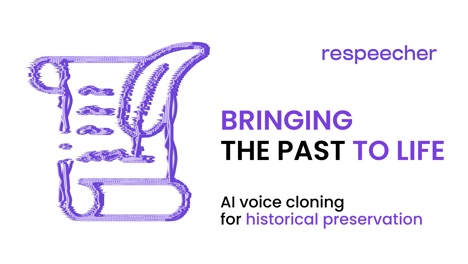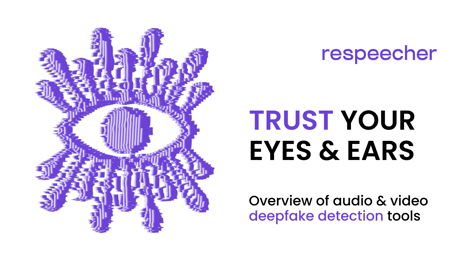Personalize and Scale Chatbots with Voice Cloning

According to Statista, the income generated by the chatbot sector in 2023 is $137.6 million. Furthermore, AI chatbots helped 55% of businesses generate high-quality leads.
There are very few internet users who have never interacted with chatbots. These programs offer a level of convenience, accuracy, and speed that is impossible for humans to match. They provide automated responses to frequently asked questions, help customers find solutions to their problems quickly and efficiently, and issue product recommendations based on individual preferences.
Still, AI chatbots may not always sound like humans, making the interaction with them feel unnatural and robotic. Fortunately, recent advancements in AI voice cloning technology have gone a long way toward alleviating these shortcomings. AI voice generator technology enables chatbots to mimic human speech patterns and intonations more accurately, enhancing the overall user experience.
What are AI chatbots?
AI chatbots are computer programs that simulate human conversations through artificial intelligence. They can understand user input, respond with intelligent and relevant information, and have the ability to interact using natural language processing. Moreover, AI chatbots have the capacity to use colloquial language and include a diverse sentence structure while incorporating uncommon words into each statement.
A few use cases for AI chatbots include customer service and support, virtual assistance for booking appointments or providing product recommendations, interactive marketing through automated conversations, and even medical diagnoses. For example, an AI chatbot can help customers select a product based on their individual needs by understanding the context of a conversation with the individual customer. Additionally, an AI chatbot can provide personalized health advice to patients after they list out their symptoms via a chat interface.
Regarding customer service, chatbots can automate tedious tasks such as answering FAQs so that human employees can focus on higher-priority issues.
Text-to-speech voice synthesis enhances AI chatbots, enabling them to respond with natural-sounding speech, thus improving user experience and accessibility.
Some of the most popular use cases for AI chatbots include:
Contact centers
Contact centers are increasingly turning to AI chatbots as a viable output option due to their potential to significantly improve customer service. By leveraging natural language processing (NLP), machine learning algorithms, and conversation analytics, AI chatbots can provide prompt, personalized responses in real time that accurately address customer needs. Contact centers that use AI chatbots can also free up human resources for more complex customer interactions, ultimately leading to increased productivity and cost savings.
Advertising
With the ability to quickly understand the context of conversations, AI chatbots can provide personalized recommendations or advice tailored specifically to customers' needs. With the capabilities of speech synthesis technology, it is also possible to set up chatbots on your website so that users can simply enter some information and receive personalized messages via celebrity/character voices.
Healthcare
AI chatbots have the potential to provide faster response times and more accurate diagnosis through advanced natural language processing algorithms. Additionally, AI chatbots can be used to help healthcare professionals triage their workloads by providing quick responses to patient questions or clarifications on medications or treatments.
Retail
Here AI chatbots provide customer service and product recommendations. They can be used to answer customer queries, handle product returns, or suggest additional items to purchase based on past purchases and browsing history. AI chatbots also have the potential to improve customer experience by providing personalized shopping guidance tailored specifically to customers' needs.
Why use a chatbot text-to-speech tool?
Text-to-speech voice cloning technology is a powerful tool for creating lifelike, natural conversations between chatbots and their users. By utilizing specific words that reflect the writer's expertise and personal experience, varied sentence structures, colloquial language, and factual examples, text-to-speech voice cloning allows bots to communicate more like a human than a machine. This makes conversations between bots and customers more dynamic and engaging rather than robotic or repetitive.
TTS can read every piece of text that resembles a real human speaking. However, users will still be able to distinguish that it’s a robot speaking as it lacks emotions in contrast to STS voice AI (speech to speech) where a person speaks and converts into a target voice.
STS voice synthesis helps fix these shortcomings by modifying and overlaying the voice with another one (choose from different voices in our Voice Marketplace). You can also upload your own recording. STS allows for synthesizing iconic vocalists of the past and even removing or adding accents using an AI voice generator. Through the use of a realistic voice changer, chatbots can adapt their speech patterns and tone to better match user preferences, creating an even more immersive and enjoyable interaction.
What is speech-to-speech voice cloning technology?
In short, speech synthesis powered by AI allows you to cover your most critical use cases that involve speech (not text) as a source for generating speech in another voice.
With speech-to-speech voice cloning technology, you can make yourself sound like anyone or anything you can imagine. Additionally, using a voice maker enhances customization, offering more flexibility for creating unique voices across various applications.
Here are just a couple of reasons to choose STS over TTS:
- STS allows you to do what is impossible with TTS — synthesize iconic voices of the past. Additionally, a voice maker like Respeecher enhances the range of voices available, allowing for greater creativity and diversity in speech synthesis.
- STS voice cloning allows you to achieve a more colorful emotional palette of speech. Integrating voice AI into the process provides finer control over emotional nuances and tones, resulting in more expressive speech synthesis.
- STS technology allows to scale the content production for those celebrities who are unable to work simultaneously on several projects.
With Respeecher, you can power up your AI chatbot by incorporating AI voice cloning technology with human-like voices and sprinkle in new content like accents for a more enjoyable and engaging experience. Additionally, integrating a realistic voice changer further enhances the versatility of your chatbot, allowing it to adapt its voice to different contexts and personalities seamlessly. Add, remove, or replace any speech or accent at your convenience.
How to start with voice cloning for AI chatbots?
Today, AI voices can match a wide range of emotions, speaking styles, and non-speech vocalizations. To experience how Respeecher conveys different emotions and speech styles, through our innovative AI voice changer technology, contact us.
We’re constantly looking for different ways to help new projects or businesses get the most out of speech synthesis technology. Explore the possibilities of enhancing your AI chatbot's capabilities with our AI voice generator technology.

- voice assistant
- artificial intelligence
- AI voice synthesis
- artificial intelligence (AI)
- synthetic voice
- text-to-speech (TTS) synthesis
- speech-to-speech (STS) voice synthesis
- voice cloning technology,
- voice assistants
- voice conversion technology
- Respeecher
- voice cloning speech synthesis
- voice cloning solutions
- Voice cloning and conversion technology
- AI voice generator
- AI technology
- Respeecher's AI-powered voice cloning
- AI chatbots
- Respeecher Voice Marketplace
- AI voice cloning
- AI voice changer
- customer service
- realistic voice changer
- voice ai
- voice maker
- text-to-speech voice conversion





